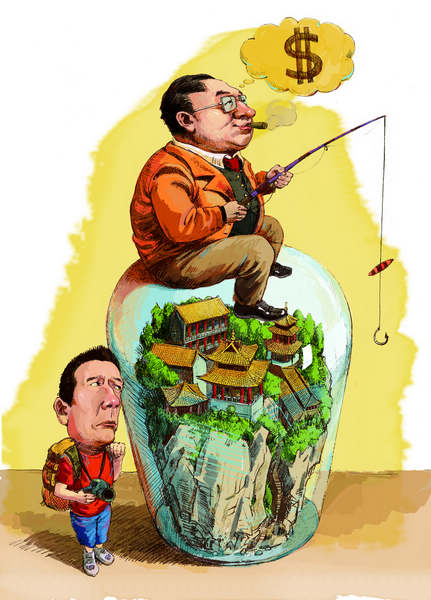Publicity
The tourist industry, directly and indirectly, created 100,000 new jobs for the city. Farmers sold more than 200 million salted duck eggs in 2011, for 400 million yuan, Wang said.
To promote tourism in Zaozhuang, the municipal government formed a special office to generate publicity efforts across the country. The government also set a tourist number target for each department, district and site to bring to the city and made evaluations based on their performances.
Every week, the office generates a report on how many advertisements or promotional stories were placed on TV and newspapers, how many publicity posts were made on which Web forums, and how many brochures were distributed to which companies and organizations.
Among more than 20,000 tourism spots in China, income from ticket sales accounts for 30 percent of the total income of the spots on average, said Zhang of the tourism institute of Beijing Union University. For smaller tourism spots, the percentage is even higher.
"The finance of some local government relies heavily on tourism tickets, and therefore the government gives the nod for prices to rise, ignoring the long-term development of tourism spots," said Zhan Dongmei, an expert with the China Tourism Academy.
"Although scenic areas are owned by the central government, they are actually run by the local government. It is not clear who owns the rights or has overall responsibility for these tourism spots, so nobody is held responsible for increasing costs," she continued.
But rising ticket prices are tolerated by a majority of tourists.
Zhang noted that tickets only account for a small part of traveling expenses and therefore people rarely give up their plans simply because a ticket may cost more.
Even if they have to pay 100 percent more for a ticket that previously cost 100 yuan, the increase is, more often than not, accepted.
Besides, the growing demand for people to travel and have a break, especially on weekends and holidays, also helps push up the price. After Taierzhuang raised its prices it still received more than 22,800 visitors on Saturday, April 21.
Lao Yibo, a tourism-planning consultant based in Guangdong province, said most domestic tourism destinations rely too much on admission tickets as a main channel for income.
"And it seems that the ticket price does not have too much of an impact on the number of tourists as there are more people traveling nowadays. As a result, for managers of these tourism destinations, raising ticket prices is the least risky and easiest way to make money.
"However, this is still a beginner's way of developing tourism," he said.
Discount
In contrast, according to Lao, many tourism sites in other countries are ticket-free, or only a small entrance fee is charged.
|
 |
|
Song Chen / For China Daily |
For instance, in Japan, the entrance fees for tourist sites are kept deliberately low. People do not need to pay to climb Mount Fuji.
And a majority of museums are also free. But people do need to buy expensive tickets at theme parks, such as Disneyland, as well as commercial shows and exhibitions.
In France, the average ticket price at tourism attractions is about 10 euros ($13.2). The government also has discounts to attract tourists. For instance, the admission for adults to the Louvre Museum is 9.5 euros and free of charge the first Sunday of each month. The museum also has a year pass for 15 euros for youths between 18 and 25.
Government subsidies play a role as do souvenir sales.
"I don't buy souvenirs normally but I bought one very expensive piece in Japan. It was of very high quality, so I didn't hesitate to pay for that," said Lao.
Contact the reporters at jiangxueqing@chinadaily.com.cn or lij@chinadaily.com.cn
